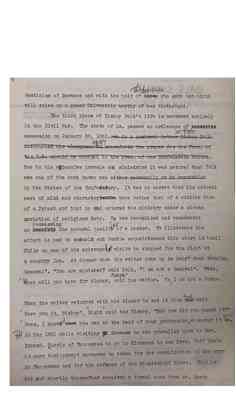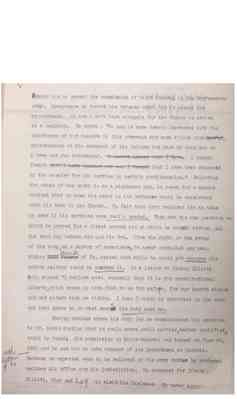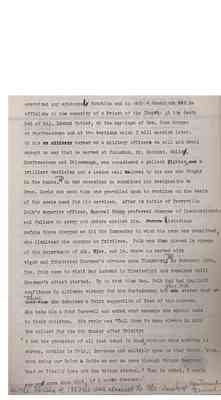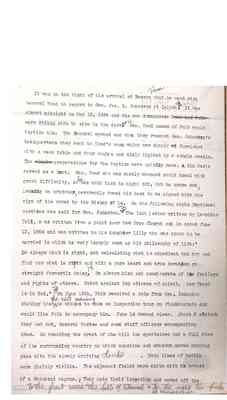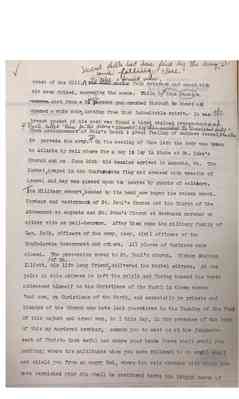Pages
21
destinies of Sewanee and with the help of {struckthrough: those} {added: the dioceses} who gave her birth will raise up a great University worthy of her birthright.
The third phase of Bishop Polk's life is centered entirely in the Civil War. The state of La. passed an ordinance of {x-ed out: cessation} secession on January 26, 1861, {struckthrough: and in a pastoral letter {{added: in Feb.}} Bishop Polk instructed his clergymen {{struckthrough: to}} {{added: that}} henceforth the prayer for the Pres. of the U.S. should be changed to the Pres. of the Confederate States.} Due to his e{"s" changed to "x"}tensive travels and ministries it was natural that Polk was one of the best known men {struckthrough: either personally or by reputation} in the States of the Confederary. It was no secret that his natural bent of mind and character{struckthrough: istics} were rather that of a soldier than of a Priest and that he had entered the ministry under a strong cnviction of religious duty. He was recognized and remembered as {x-ed out: possibly} possessing the natural qualit{"y" changed to "ies "} of a leader. To illustrate the effect he had on casual{x-ed out: t} and humble acquaintances this story is told: While on one of his episcop{"te" changed to "l"} visits he stopped for the night at a country Inn. At dinner when the waiter came up he Said" Good Evening, General". "You are mistaken", said Polk, "I am not a General". {Struckthrough: Well}, {"w" changed to "W"}hat will you have for dinner, Judge{added: "} said the waiter. {Added: "}No{added: ,} I am not a Judge.{added: "}
When the waiter returned with his dinner he set it down {struckthrough: sna} {added: and} said {added: "}Here you is, Bishop", {added: "}Right{added: "} said the Bishop, "But how did you guess it?" {Added: "}Boss, I know{"s" changed to "ed"} {struckthrough: that} you was at the head of your profession{added: ,} whatever it {struckthrough: is} {added: was}. {Added: paragraph marker} In May 1861 while visiting {struckthrough: in} Sewanee he was prevailed upon by Gov. IshamG. Harris of Tennessee to go to Richmond to see Pres. Jeff Davis to urge that prompt measures be taken for the organization of the army in Tennessee and for the defence of the Mississippi River. This he did and shortly thereafter received a formal note from Mr. Davis
22
Urging him to accept to commission of Major General in the Confederate Army. Everywhere he turned his friends urged him to accept the appointment. It was a very hard struggle for the Bishop to arrive at a decision. He wrote : "No man is more deeply impressed with the importance of our success in this movement nor more filled with {added and struckthrough: more} apprehension at the prospect of its failure but what my duty may be I have not yet determined. {Struckthrough: I cannot ignore what I Know.} I cannot forget {struckthrough: what I have learned nor can I forget} that I have been educated by the country for its service in certain contingencies." Believing the cause of the south to be a righteous one, he never for a moment doubted that to draw the sword in its defencse would be consistent with his vows to the Church. He felt that duty required him to take up arms if his services were really{underlined} needed{underlined}. That was the one question on which he prayed for a direct answer and on which he sought advice. All the rest lay betwen him and his God. Upon the right or the wrong of the step{added: ,} as a matter of conscience{added: ,} he never consulted any man. Bishop {illegible x-ed out} {struckthrough: Murray} {added: Meade} of Va. stated that while he could not approve{underlined} his action neither could he condemn{underlined} it{underlined}. In a letter to Bishop Elliott Polk stated "I believe most solemnly that it is for constitutional liberty{added: ,} which seems to have fled to us for refuge, for our hearth stones and our altars that we strike. I hope I shall be supported in the work and have grace to do what seem{struckthrough: ed; added: s} the{underlined} duty{underlined} next{underlined} me{underlined}.
Having decided where his duty lay he communicated his decision to Mr. Davis stating that he would serve until another{added: ,} better qualified{added: ,} could be found. His commission as Major-General was issued on June 25, 1861 and he set out to take command of his Department at Memphis. {added: add bottom of 9b} Because he expected soon to be relieved of his army duties he resigned neither his office nor his jurisdiction. He arranged for Bishop{added: s} Elliott, Otey and Lay to visit his Parishes. He never again
23
exercized any episcopa{"ts" changed to "l"} function and on only 4 occasions did he officiate in the capacity of a Priest of the Church: At the death bed of Maj. Edward Butler, at the marriage of Gen. John Morgan at Murfreesboro and at two baptisms which I will mention later. On his {x-ed out: ca military} career as a military officer we will not dwell except to say that he served at Columbus, Ky, Belmont, Shilo{struckthrough: w}, Murfreesboro and Chicamauga, was considered a gallant fighter{added: ,} {struckthrough: and} a brilliant tactician and a leader well {struckthrough: be}loved by the men who fought in the ranks. {Paragraph marker} On two occasions he submitted his resignation to Pres. Davis but each time was prevailed upon to continue on the basis of the acute need for his services. After the battle of Perryville Polk's superior officer, General Bragg preferred charges of insubordinatio and failure to carry out orders against him. {Struckthrough: Future} {"h" changed to "H"}istorians refute these charges as did the Commander to whom the case was submitted{added: ,} who dismissed the charges as frivilous. Polk was then placed in charge of the Department of Ala. Miss, and La. where he served with vigor and frustrated Sherman's advance upon Vicksburg{struckthrough: ,} {Paragraph marker} {"i" changed to "I"}n February 1864. Mrs. Polk came to visit her husband in Mississippi and remained until Sherman's attact started. Up to that time Gen. Polk had had implicit confidence in ultimate victory for the Confederacy but {struckthrough: she} {added: Mrs. Polk} states that {struckthrough: at} {struckthrough: that time} {added: then} she detected a faint suggestion of fear of the outcome. She bade him a fond farewell and asked what message she should take to their children. His reply was "Tell them to keep always in mind the collect for the 4th Sunday after Trinity:
{added: "}O God the protector of all that trust in the{added: e,} without whom nothing is strong, nothing is Holy,; Increase and multiply upon us they Mercy, that, thou being our Ruler & Guide we may so pass through things temporal that we finally lose not the things eternal." Then he added, {added: "}I could say no{struckthrough: t} more than that, if I spoke forever.{added: "} {Added: In the Spring of 1863 he was advanced to the rank of Lieutenant General.}
24
It was on the night of his arrival at Resaca {added: Tenn.} that he went with General Hood to report to Gen. Jas. E. Johnston at Dalton {added: Ga.}. It was almost midnight on May 15, 1964 and the two commanders {struckthrough: Hood and Polk} were riding side by side in the dark{added: ness.} Gen. Hood asked if Polk would baptize him. The General agreed and when they reached Gen. Johnston's headquarters they went to Hood's room which was simply {x-ed out: wi} furnished with a mess table and four chairs and dimly lighted by a single candle. The {struckthrough: simple} preparations for the baptism were quickly made. A tin basin served as a font. Gen. Hood who was sorely wounded could kneel with great difficulty, so {added: he} was told that he might sit, but he arose and{added: ,} leaning on crutches{added: ,} reverendly bowed his head to be signed with the sign of the cross by the Bishop of La. On the following night Baptismal services was said for Gen. Johnston. {Paragraph marker} The last letter written by Leonidas Polk, w as written from a point near New Hope Church and is dated June 13, 1864 and was written to his daughter Lilly who was about to be married in which he very largely sums up his philosophy of life:" Do always what is right, not calculating what is expedient but try and find out what is right and with a pure heart and true devotion go straight fowardin doing {added: it.} Be always kind and considerate of the feelings and rights of others. Watch against imp atience of spirit. Our Trust is in God." {Paragraph marker} On June 13th, Polk received a note from Gen. Johnston stating that {insert symbol: the next morning} he wished to make an inspection tour on PineMountain and would like Polk to accompany him. June 14 dawned clear. About 8 o'clock they set out, General Hardee and some staff officers accompanying them. On reaching the crest of the hill the spectators had a full view of the surrounding country on which sunshine and shadows moved keeping pace with the slowly drifting {added: clouds}. Both lines of battle were plainly visible. The adjacent fields were white with the covers of a thousand wagons. {insert symbol: to the front were the hills of Etowah & to the right the peaks of Kennesaw.} They made their inspection and moved off the
25
crest of the Hill. {Insert symbol: Several shells had been fired by the evening, 21. some falling close.} {Struckthrough: For some reason} {Added: To take a farewell view,} Polk returned and stood with his arms folded, surveying the scene. While he {moved from after "thus": stood} thus a {struckthrough: cannon} shot from a 3{"1" changed to "inch"} parrott gun crushed through his chest and opened a wide door{added: ,} letting free that indomitable spirit. In {struckthrough: his} {added: the} breast pocket of his coat was found a blood stained prayer-book {added: and 4 tracts, called "Balm for the weary & wounded," 3 of them inscribed to Generals Hood Hardee & Johnston.} Upon announcement of Polk's death a great feeling of sadness seemed to pervade the army. {Paragraph marker} On the evening of June 14th the body was taken to Atlanta by rail where for a day it lay in State at St. Luke's Church and on June 29th his remains arrived in Augusta, Ga. The Casket{added: ,} draped in the Confederate flag and covered with wreaths of Laurel and bay was placed upon the hearse by guards of soldiers. {"t" changed to "T"}he Military escort{added: ,} headed by its band{added: ,} now began the solemn march. Wardens and vestrymen{x-ed out: t} of St. Paul's Church and the Church of the Atonement at Augusta and St. John's Church at Savannah marched on either side as pall-bearers. After them came the military family of Gen. Polk, officers of the army, navy, civil officers of the Confederate Government and others. All places of business were closed. The procession moved to St. Paul's church. Bishop Stephen Elliott, {added: /of Ga.} his life long friend{added: ,} delivered the burial address. At one point in this address his left the pulpit and facing toward the North addressed himself to the Christians of the North in these words: "And now, ye Christians of the North, and especially ye priests and bishops of the Church who have lent yourselves to the fanning of the fury of this unjust and cruel war, do I this day, in the presence of the body of this my murdered brother, summon you to meet us at the judgmentseat of Christ- that awful bar where your brute force shall avail you nothing; where the multitudes whom you have followed to do ev{struckthrough: e}il shall not shield you from an angry God, where the vain excuses with which you have varnished your sin shall be scattered before the bright beams of
